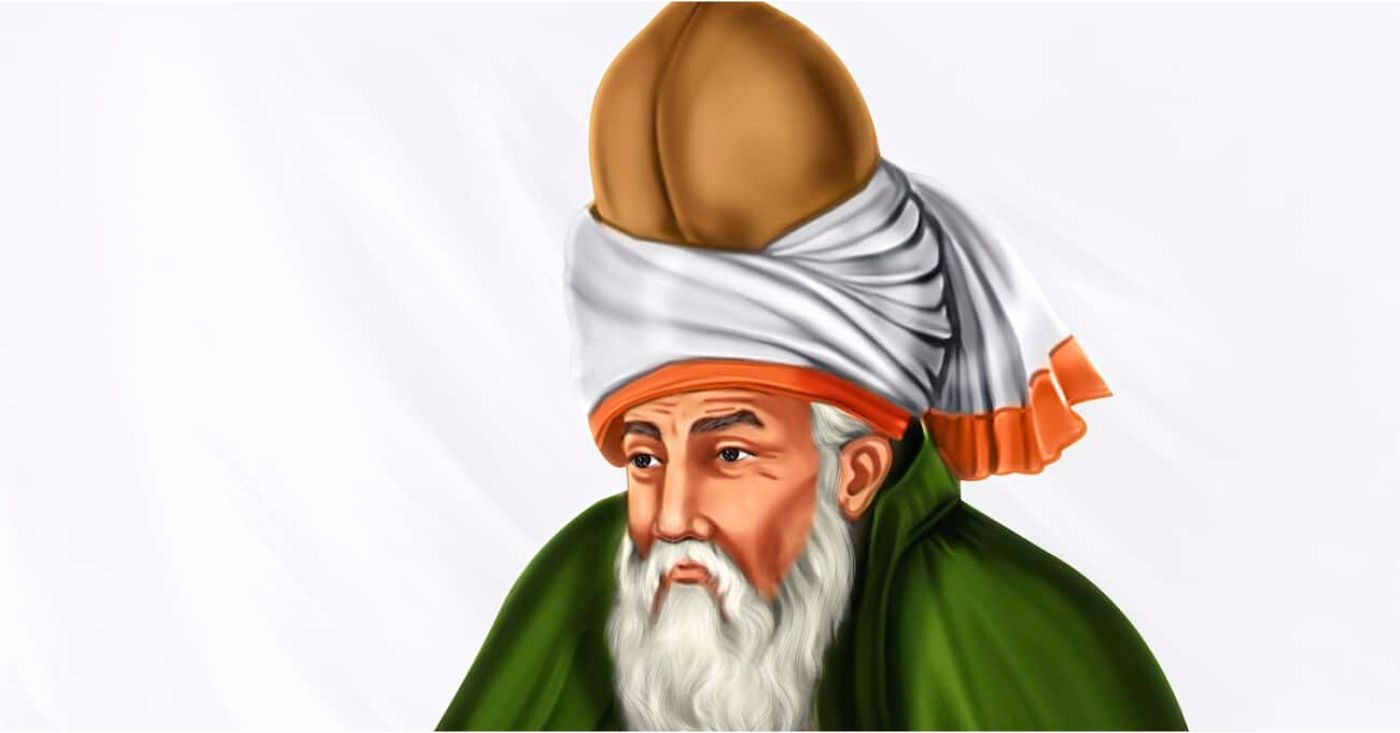Mevlana Celaleddin Rumi was a 13th-century Persian poet, jurist, theologian, and Sufi mystic. He was born in 1207 in the city of Balkh, which is now in Afghanistan, but at the time was part of the Seljuk Empire. His family was forced to flee to Anatolia (modern-day Turkey) due to the Mongols invading Balkh, and Rumi eventually settled in Konya, where he spent most of his life.
Rumi’s father, Bahaeddin Veled, was a renowned scholar and theologian, and Rumi received a thorough education in Islamic sciences and theology. He later became a professor of law and theology at the University of Konya.
Rumi’s most famous work is the Masnavi, also known as the “Spiritual Couplets,” which is a six-volume poem that is considered one of the greatest works of Persian literature. The Masnavi is a mystical and allegorical work that explores the relationship between God and the human soul, and it is infused with Sufi teachings and beliefs.
Rumi was also a major figure in the Mevlevi order, a Sufi order named after him. The Mevlevi order, also known as the “Whirling Dervishes,” is known for its distinctive dance, in which the dancers spin in circles while wearing long, flowing robes. The dance is meant to symbolize the journey of the soul as it moves closer to God.
Rumi’s poetry and teachings continue to be widely read and revered to this day, and he is considered one of the most important figures in the history of Sufism. His work has been translated into many languages and has influenced poets and writers around the world.
&
Mevlana Celaleddin Rumi was a 13th-century Persian poet, jurist, theologian, and Sufi mystic. He was born in 1207 in the city of Balkh, which is now in Afghanistan, but at the time was part of the Seljuk Empire. His family was forced to flee to Anatolia (modern-day Turkey) due to the Mongols invading Balkh, and Rumi eventually settled in Konya, where he spent most of his life.
Rumi’s father, Bahaeddin Veled, was a renowned scholar and theologian, and Rumi received a thorough education in Islamic sciences and theology. He later became a professor of law and theology at the University of Konya.
Rumi’s most famous work is the Masnavi, also known as the “Spiritual Couplets,” which is a six-volume poem that is considered one of the greatest works of Persian literature. The Masnavi is a mystical and allegorical work that explores the relationship between God and the human soul, and it is infused with Sufi teachings and beliefs.
Rumi was also a major figure in the Mevlevi order, a Sufi order named after him. The Mevlevi order, also known as the “Whirling Dervishes,” is known for its distinctive dance, in which the dancers spin in circles while wearing long, flowing robes. The dance is meant to symbolize the journey of the soul as it moves closer to God.
Rumi’s poetry and teachings continue to be widely read and revered to this day, and he is considered one of the most important figures in the history of Sufism. His work has been translated into many languages and has influenced poets and writers around the world.
Mevlana Celaleddin Rumi was a 13th-century Persian poet, jurist, theologian, and Sufi mystic. He was born in 1207 in the city of Balkh, which is now in Afghanistan, but at the time was part of the Seljuk Empire. His family was forced to flee to Anatolia (modern-day Turkey) due to the Mongols invading Balkh, and Rumi eventually settled in Konya, where he spent most of his life.
Rumi’s father, Bahaeddin Veled, was a renowned scholar and theologian, and Rumi received a thorough education in Islamic sciences and theology. He later became a professor of law and theology at the University of Konya.
Rumi’s most famous work is the Masnavi, also known as the “Spiritual Couplets,” which is a six-volume poem that is considered one of the greatest works of Persian literature. The Masnavi is a mystical and allegorical work that explores the relationship between God and the human soul, and it is infused with Sufi teachings and beliefs.
Rumi was also a major figure in the Mevlevi order, a Sufi order named after him. The Mevlevi order, also known as the “Whirling Dervishes,” is known for its distinctive dance, in which the dancers spin in circles while wearing long, flowing robes. The dance is meant to symbolize the journey of the soul as it moves closer to God.
Rumi’s poetry and teachings continue to be widely read and revered to this day, and he is considered one of the most important figures in the history of Sufism. His work has been translated into many languages and has influenced poets and writers around the world.
Here are a few famous quotes by Mevlana Celaleddin Rumi:
“The minute I heard my first love story, I started looking for you, not knowing how blind that was. Lovers don’t finally meet somewhere. They’re in each other all along.”
“The wound is the place where the Light enters you.”
“Let the beauty of what you love be what you do.”
“The timeless in you is aware of life’s timelessness. And knows that yesterday is but today’s memory and tomorrow is today’s dream.”
“Be grateful for whoever comes, because each has been sent as a guide from beyond.”
“Dance, when you’re broken open. Dance, if you’ve torn the bandage off. Dance in the middle of the fighting. Dance in your blood. Dance when you’re perfectly free.”
“The garden of the world has no limits, except in your mind.”
“Out beyond ideas of wrongdoing and rightdoing, there is a field. I’ll meet you there.”
